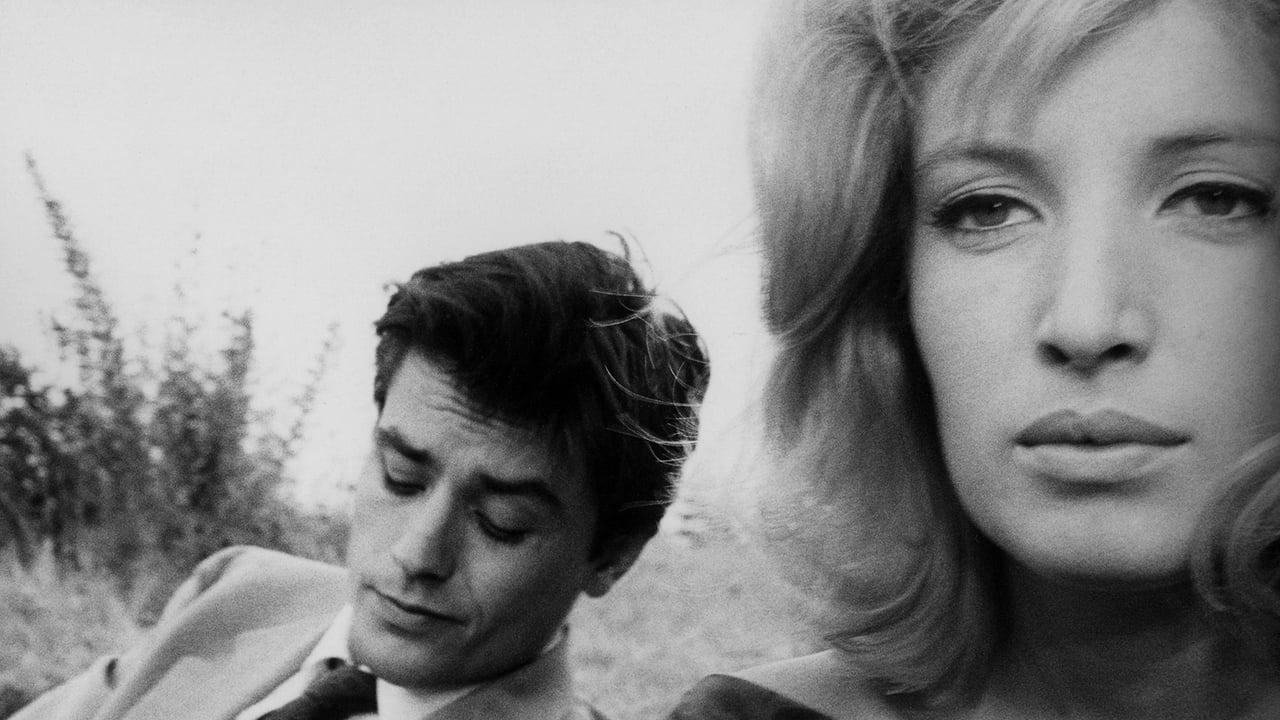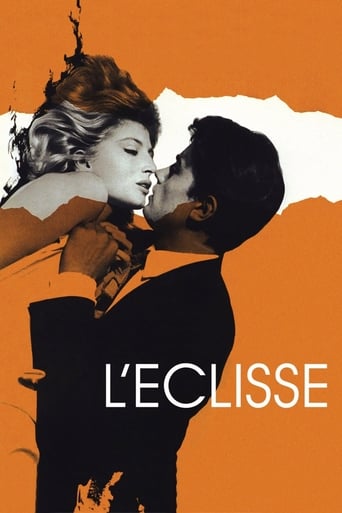

Once again a character played by Monica Vitti is bored out of her skull. She has beauty and advantages and yet her existence (at least to her) is not worthwhile. As is the case with most Antonio femmes, she hooks up with a man who offers her nothing, other than his good looks. The first ten minutes or so shows the deterioration relationship between the two of them. She begins to search for greener pastures. There is a subplot involving the Italian stock marker, where she comes upon a young man whom she is attracted to. He is stockbroker who falls on hard times when there is huge bubble in the market and many of his clients are in deep do do, including Vitti's mother. He is frustrated because when they make money, he gets on credit, but when they lose it, they are on his doorstep. There are lots of scenes of basic imprisonment and shadows. The young woman makes plans, but those plans never come to fruition. Marvelously shot in black and white. Great long shots as the character wanders streets, walking, walking, walking.
... View MoreIt's more about Poetry and Photography than anything else.. You can see the flow from the very first begging, elements' usage and Camera Panoramic Movement! you can always see this Comparison between underlying beauty in the old city styles, and materialist new civilization Burning everything around it.. this very living 6 mins "the first six of last ten" rapidly moving and full of life till it broke the rhythm when Vittoria went down stairs! and then the big Scene Of "Fine" .. Total work of Poetry And Photography.. It was Bit slow YES but this was totally one of it's photographic characters.. and condensed YES because this is Poetry :) Enjoy it.
... View MoreBilled as the last episode of Michelangelo's unofficial "Incommunicability Trilogy", after L'avventura (1960) and La notte (1961), the film's structure is as elusive as the latter part of L'avventura (a 6/10), while the pathos is not as empowering as La notte (a 8/10). As a result a in-between score of 7 out of 10 is my rating. It's an elliptical essay about a mental plight of a woman's inner state, Michelangelo uses plentiful close-ups to enhance a visceral image of the troubled soul of our protagonist Vittoria (Monica Vitti), and the nihilistic struggle of any frayed individual is so incisive as that one can not get out of its grip afterwards. It's inherits the energizing effect of suffering on character, particularly female character throughout the trilogy, Antonioni's muse Monica Vitti exposes herself without any lines of theatrical rendering, her emotion inward is lumbering and stressful to viewers, which could be divined as the auteur's intention. Her counterpart, a youthful Alain Delon though billed first, is underplayed, emits very limited evocation compared to Vitti.The tumultuous control of the stock market scenes is an emblem of Antonioni's remarkable progress of character introspection under a social context (almost harks back to Hollywood luminary Frank Capra's expertise). Nearly without any score, a bleak realistic setting with deployment of the natural sound again testify that Antonioni is the backbone of New Wave movement not only in Italy but also in the whole planet! The commitment to beauty, grace and sensitivity is by and large foregrounded. A marvelous almost 8-minutes-long non-relevant ciphers montage ending is unexpected mesmerizing, and the ending scene of the radiation of street lights converges into a quasi-eclipse phenomenon delivers an impeccable finale for the film and the trilogy, an incommunicatively mundane world alone can be an endless source for filmmakers to excavate!
... View MoreGoing backwards through Antonioni's films, I encounter what is with the exception of Blowup his most famous film, one of the cornerstones at least. Forty years after it was made it stands as a prophecy of minimal cinema to come, an early configuration of what is possible to do with a certain kind of story, but sadly not much more.I like how he renders the morning after a painful breakup, with anguish and irritation in empty streets, but also with the aimless excitement of newfound freedom and time. Monica Vitti fills this time that would have been consumed before with the affairs of a relationship by strolling around, the world now a game of possibilities, where the lack of purpose and direction hold their own allure. Life can be anything again. This is not an opportunity to meditate though, but rather of becoming open again to the flow of life, see where desire will sweep us to.Summer is a character here, indeed in a way that prefigures the transparent realities that would emerge in Antonioni's later films, I can sense poignantly the hot languid mood of summer life in the city, at once inviting and arresting movement. But the romance that is supposed to carry the film after the world has been sketched is not up to the task. The two partners feign, thrust, fall in love, coy or anxious or excited, then withdraw. The flow of life doesn't stop for the dead and it does't stop for the lovers. Two scenes connected by the incessant ringing of telephones connect this. Perhaps the romance is not up to the task because Antonioni believes that love isn't, that the two partners brought close in communion are still worlds apart and love alone cannot hope to bridge the distance. We get the first inklings of the emptiness of desire, Antonioni would perfect this in his following film.The importance of all this is perhaps that in 1962 it was desirable to see a love story done this way. The novelty alone was thought enough to vindicate the experiment.But when Antonioni feels free to be as New Wave as he wants in the finale, the film soars. The symbolism of a barrel of water that represents something running out deafens the ears amid all the silence - it says too much and too little. But that silence of shots deserves to be admired, more Japanese than French.
... View More